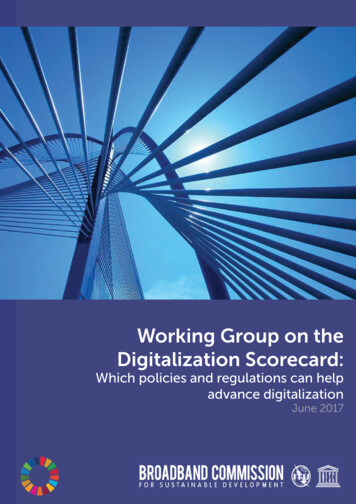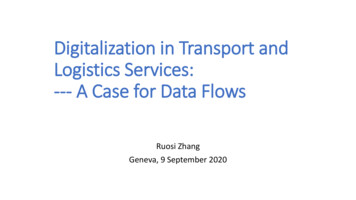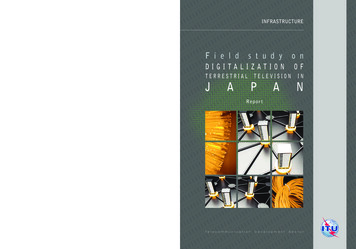
Transcription
Working Group on theDigitalization Scorecard:Which policies and regulations can helpadvance digitalizationJune 2017
Working Group on theDigitalization Scorecard:Which policies andregulations can helpadvance digitalizationJune 2017Chaired by:
AcknowledgmentThis report has been created collaboratively, drawing on contributions and insightsfrom the participants of the Broadband Commission Working Group on DigitalizationScorecard, under the auspices of the Broadband Commission for SustainableDevelopment.The Broadband Commission Working Group on Digitalization Scorecard is chaired by MrRajeev Suri, CEO of Nokia. Nokia has coordinated the process of drafting the documentwith special acknowledgement to Mr Barry French, Mr Marc Vancoppenolle, and MsJulia Jasinska from Nokia, with data research provided by PwC led by Mr MohammadChowdhury. Support of the Working Group was given by Ms Phillippa Biggs and Ms AnnaPolomska of the Broadband Commission Secretariat at ITU.We wish to thank the Broadband Commissioners and Commissioners’ focal pointsmembers of the Working Group for their invaluable contributions, kind review, and usefulcomments (listed in alphabetical order of institution): iiMr Sunil Bharti Mittal, Mr Himar Arjun Singh, Bharti EnterprisesMr Börje Ekhlom, Ms Elaine Weidman, EricssonMr Andrus Ansip, Mr Daniel Spoiala, European CommissionMr Kevin Martin, Mr Christopher Hemmerlein, FacebookMr Philipp Metzger, Mr Nicolas Rollier, Federal Office of Communications OFCOM,SwitzerlandBaroness Beeban Kidron, Filmmaker and Founder of 5RightsH.E. Ms Anusha Rahman Khan, Minister of State for Information Technologyand Telecommunication, Mr Muhammad Haroon Javed, Mr Mudassar Hussain,Government of PakistanMr Mats Granryd, Ms Belinda Exelby, Ms Jeanine Vos, Ms Natalia Pshenichnaya, GSMAMr Luis Alberto Moreno, Mr Antonio Garcia Zaballos, Mr Enrique Iglesias RodriguezInter-American Development Bank-IADBMr Leong Keng Thai, Ms Eunice Lim, Infocomm Media Development Authority ofSingapore (IMDA)Mr Rupert Pearce, Ms Donna Murphy, Inmarsat plcMr John Galvin, Ms Christina Chin, IntelMr Houlin Zhao, Ms Doreen Bogdan Martin, Ms Phillippa Biggs, Mr Hani Eskandar,Ms Youlia Lozanova, Ms Sofie Maddens, Ms Anna Polomska, Ms Nancy Sundberg,International Telecommunication Union (ITU)Dr. Dato Lee Yee Cheong, ISTICDr. Speranza Ndege, Kenyatta University KenyaWorking Group on the Digitalization Scorecard: Which policies and regulations can help advance digitalization
Dr. Chang-Gyu Hwang, Ms Eun Ji Kim, Mr Byungki Oh, KT CorporationMr Paul Mitchell, MicrosoftMr David Atchoarena and Mr Fengchun Miao, UNESCOMs Phumzile Mlambo-Ngcuka, Ms Ruth Miyandazi, UN WomenMr Jean-Yves Charlier, Mr Melle Tiel Groenestege, Mr Tomas Lamanauskas, VeonMr Francis Gurry, Ms Michele Woods, World International Property OrganizationMr Scott Gegenheimer, Ms Jennifer Suleiman, Mr Andrew Arowojolu, Zain GroupExternal Experts Mr Henry Forero, MsNatasha Beschorner, The World BankMr Ken Lohento, Centre for Agricultural and Rural Cooperation (CTA),NetherlandsMr Cristhian Lizcano Ortiz, Consultor en Asuntos Jurídicos y RegulatoriosColombiaProf. Ailisto Heikki, Technical Research Centre of FinlandMr Jari Konttinen, Ms Salla Ahonen, Confederation of Finnish Industries (EK),FinlandMr Jani Lukander, Mr Virve Jokiranta, PwC Finland; Mr Julian Smith, Ms KylieCollins, PwC Indonesia; Mr Charles Loh, Mr Zubin Daruwalla, PwC SingaporeH.E. Minister Rudiantara Minister of Communication and Information Technology,IndonesiaMs Yudianto, SKM, M.Si, Ministry of Health, IndonesiaMr Ali Zaryab, Mr Syed Ahmad Mehdi, Telenor PakistanMr Snehal Patel, SingaporeWorking Group on the Digitalization Scorecard: Which policies and regulations can help advance digitalizationiii
Table of ContentsAcknowledgements iiForeword viIntroduction 8Executive Summary 12Digitalization Scorecard 14Scorecard summary 15Recommendations 28Digital foundations 29Agriculture 30Education 30Government 31Healthcare 32Transportation 33Approach and Methodology Selection of countries 35Selection of sectors 36Identification of policy and regulatory blockage 37Assessment of policy and regulatory framework 41Reference table for digital foundation by country 43Reference table for policy and regulatory framework by country 55Colombia Finland Indonesia Kenya Pakistan Singapore iv34Working Group on the Digitalization Scorecard: Which policies and regulations can help advance digitalization556168748188
Key Definitions 94Abbreviations 95References 98Colombia 98Finland 100Indonesia 103Kenya 104Pakistan 105Singapore 106Table Table 1: Recommendations for digital foundation 29Table 2: Recommendations for agriculture 30Table 3: Recommendations for education 30Table 4: Recommendations for government 31Table 5: Recommendations for healthcare 32Table 6: Recommendations for transportation 33Table 7: Digital Foundation blockages/enablers assessment criteria 38Table 8: Agriculture blockages/enablers assessment criteria 38Table 9: Education blockages/enablers assessment criteria 39Table 10: Government blockages/enablers assessment criteria 39Table 11: Healthcare blockages/enablers assessment criteria 40Table 12: Transportation blockages/enablers assessment criteria 40Working Group on the Digitalization Scorecard: Which policies and regulations can help advance digitalizationv
ForewordsHoulin ZhaoSecretary-General of the International TelecommunicationUnion (ITU), The Co-Vice Chair of the Broadband CommissionConnectivity lies at the heart of digitalization. To benefit from the wealth of content andservices available online, people everywhere have to have access to information andcommunication technologies. This is the core mission of the Broadband Commission,which has been calling for affordable and equitable access to ICTs for all people since itsinception in 2010. Yet despite progress, much of the world’s population still lacks access,thereby holding back progress towards the 2030 Agenda for Sustainable Development. Tothat end, the conclusions of this Working Group study are a valuable tool for showing howspecific digital interventions may contribute to achieving the Sustainable DevelopmentGoals.While increasing connectivity is essential, it is not enough. Not in today’s world, wheredevelopments in automation, the Internet of Things and artificial intelligence, to name afew, have brought about new opportunities but also new challenges with which to contend.This rapid digital transformation must be accompanied by an equally fast and appropriateregulatory response. The different actors of the ICT ecosystem need to engage in ameaningful discussion, within and across sectors. Because ICTs underpin vital achievementsand modern services in many sectors, governments and industry must increasinglywork together to create the conditions needed to facilitate the growth of broadband forsustainable development. ITU has been advocating for this multi-stakeholder approach,working extensively with its Members States from developing and developed countriesalike to provide the tools for an effective policy, legal and regulatory environment for theICT sector.As Co-Vice Chair of the Broadband Commission for Sustainable Development, I warmlywelcome this Working Group report as an important contribution to the ongoing workprogramme of the Commission. At a time when we are entering a digital revolution,policy makers and regulators everywhere are grappling with common and unfamiliarquestions about how to balance and guide the path to digitalization. This study provideslessons learned from six pilot countries and draws on these examples with a set ofrecommendations calling for the strong digital foundation to support the digitalization in thesectorial initiatives. Moreover it builds on the Commission’s call for further cross-sectorialcooperation in implementing inclusive and forward-looking ICT regulations for a world ofdigital opportunities for all.viWorking Group on the Digitalization Scorecard: Which policies and regulations can help advance digitalization
Rajeev SuriPresident and Chief Executive Officer of NokiaThe Chair of the Broadband Commision’sWorking Group on the Digitalization ScorecardThe world is changing at an unprecedented rate. Demographic and economic powershifts, significant technological breakthroughs, rapidly accelerating urbanization, and evenclimate change all stand to benefit from digital technologies that are changing the way welive, work, and play.Digitalization – the conversion from the analog world into one of digital communicationsand its multiple applications across the many domains of our society – is the foundation forcreating a connected world that makes us safer, healthier, smarter, and more productive.Just imagine a world where access to educational resources is equal, no longer affectedby geographic location, income, and other factors. Or, a world where digitalization opensup new agricultural opportunities through automation and better decision-making as aresult of powerful data analytics. Or, a world that provides more accessible, affordable,and higher-quality health care for all.These are some of the benefits digitalization can provide when societies embrace theconnected world. Yet, in some areas, these benefits are delayed or unavailable simplybecause current regulations and policies are not keeping up with the pace of innovation.That is why I was honored to introduce the ‘Digitalization Scorecard’ project in March of2016 to the Broadband Commission. It is an effort focused on helping governments assesstheir policy framework across multiple priority sectors, such as e-learning or the adoptionof the Internet of Things (IoT) for health care. I am very grateful for the strong supportof the Digitalization Scorecard Working Group, which also includes fellow BroadbandCommission members. They have been instrumental in developing this report.With a focus on helping to unleash the economic and societal benefits of digitalization,the Working Group’s report presents key recommendations and best practices that enablegovernments to learn how to create adequate policy frameworks. It addresses both theobstacles and enablers to digitalization (such as digital literacy, security, and cloud policyframeworks) that are common across sectors, as well as sector-specific frameworks.Six countries have been assessed. While some are more advanced than others in takingimportant steps toward policies and regulations that enable digitalization, more work stillneeds to be done.I am convinced that policy frameworks which incorporate digitalization will make ameaningful impact toward meeting the UN Sustainable Development Goals more quickly.I hope that this report will bring useful insights to governments and policymakers as theyembark on their journey, to realize the full benefits of a connected world and improve thelives of all their citizens.Working Group on the Digitalization Scorecard: Which policies and regulations can help advance digitalizationvii
IntroductionWe are in a digital revolution which touches almost every community in theworldDigital technology is today touching the lives of individuals and businesses across the world.A social and economic revolution is enabled by digital technology, often underlined bythe power of the Internet. The revolution is rapidly extending beyond people to objects,illustrated by the new-found potential of the Internet of Things (IoT). The emergence andaccelerated adoption of technologies including cloud computing, artificial intelligence,connected and autonomous cars, smart cities, big data analytics, digital commerce,virtual and augmented reality and smart manufacturing is promising social and economictransformation, positive impacts on education, health and wellbeing. But as digitalizationunfolds, policy makers and regulators are faced with an unfamiliar challenge: how can theycapture the benefits of digitalization by removing blockages and introducing initiatives thatenable the pace and scale of digital change.Digitalization is a phenomenon of integrating digital technologies and ICT solutions intobusinesses and society; it is a conversion from the analogue world into one of digitalcommunications and its multiple applications across the many domains of our society.Digitalization is scaling quickly in some countries, yet more slowly in othersPolicy makers all over the world are grappling with common questions around how tobalance and guide the path to digitalization. From a global perspective, digitalization is scalingquickly in some countries, yet moving more slowly and unevenly in others. Some countriesare successfully defining country visions premised on digital technology and knowledgebased economic advancement and translating these into reality through the development ofnational ICT transformation programs and policies, the rollout of infrastructure, the adoptionof new digital services and creating the appropriate awareness of the use of these servicesamongst the populace. In a world where the experience of digitalization is new and as yetuntested in many fields, there is scope for all countries to observe what is happening totheir peers and exemplars, to implement good practice and to learn from each other. Anassessment how well countries are developing policies, adopting the digital revolution andconnecting the un-connected allows for the immediate identification of some of the bestglobal examples to follow and best practices to adopt.The digitalization scorecard explores the digitalization readiness from apolicy and regulatory perspectiveWith this context in mind, the Broadband Commission’s Working Group on DigitalizationScorecard, with the chairmanship of Nokia and data research provided by PwC, has preparedthis scorecard to evaluate the policy and regulatory readiness for digitalization identifyingspecific enablers and bottlenecks. The scorecard presents a first assessment of policyand regulatory frameworks which encourage digitalization on an economy-wide basis. Ittakes into account relevant legislations, but also their implementation and more generallygovernmental interventions.The purpose of this study is to encourage a critical revision of policy and regulatory frameworks,to map where regulations may create obstacles to the digitalization of a country’s priority8Working Group on the Digitalization Scorecard: Which policies and regulations can help advance digitalization
sectors – or where necessary policies and regulations are missing. The Working Group hasundertaken this project to support countries in introducing enabling policies sooner.It is worth emphasizing that a good policy is one which is ‘fit for purpose’, introduced timely,implemented and enforceable. The absence of an enabling policy and/or regulation is crucialto address in order to allow for digitalization of a given sector. This report is not intended toencourage regulation per se, but to point out where regulation is currently helpful (enabling)or unhelpful (blocking) for digitalization. In addition, the report aims to present concreteexamples of policy actions taken by some countries that have succeeded in digitalization,so that those can be replicated by other countries where appropriate.The scorecard explores six countries, five sectors and foundation elementsThe scorecard covers six countries, focusing on five sectors in each as well as common digitalfoundations. Together, the analysis sets out how each country is performing when it comesto policies and regulations to foster or limit digitalization. The six countries covered in thisscorecard represent high, middle and low income nations as well as a spread by geographyand size of population: High income: Finland, SingaporeMiddle income: Colombia, IndonesiaLow income: Kenya, PakistanEvery country covered in the scorecard shows a strong ambition in digitalization, a desire tosucceed, and specific policy and regulatory initiatives.Each scorecard reviews five sectors, selected because of their high socio-economic impact:Agriculture, Education, Healthcare, Government and Transportation.Each scorecard also assesses the digital foundation elements of digital leadership, digitalliteracy, cybersecurity, data protection, e-payment, and cloud services, which are allhorizontal enablers of digitalization.The pace and impact of digitalization is subject to wider factors than purely the policy andregulatory environment, for instance by political structure or general legal, economic andinvestment environments – these factors are beyond the scope of this study.Working Group on the Digitalization Scorecard: Which policies and regulations can help advance digitalization9
Good connectivity through appropriate infrastructure is a precondition fordigitalizationThe availability of an ICT infrastructure that would provide reliable and affordable connectivityis a first step on every country’s road to digitalization. Telecom and ICT infrastructure isdigitalization’s basics – in fact it can be seen as the global nervous system of a modern worldthat underpins our digital lives. However, in many countries, universal access to broadbandhas not been yet achieved. There the expansion of ICT infrastructure has to be fostered asa matter of priority. For those looking for advice on how to effectively develop and deployICT infrastructure with supportive regulations, multiple excellent publications are alreadyavailable, such as Global ICT Regulatory Outlook1 and Trends in Telecommunication ReformSeries2.Given a wealth of good quality literature on this topic, it was a choice of the Working Groupnot to duplicate the efforts but instead to move beyond pure connectivity-related aspectsof policies and regulations. To achieve a successful digitalization of the economy, thatwould best serve the society, governments need to sequence their priorities and efforts,focusing first on the necessary connectivity, then securing that a digitalization foundation isestablished with appropriate frameworks for privacy and cybersecurity and etc. Digitalizationof verticals should be built on top of that. This sequencing however does not preclude earlyconsiderations of sector-specific policies and regulations on a journey to digitalization. Onthe contrary, those governments that ensure digitalization-readiness of sectorial policiesearly on would gain an advantage and foster their countries’ digitalization.The scorecard is targeted at those with an interest in digital as well as invertical policies and regulationsOur investigation results in a series of sector-specific recommendations what governmentsshould do to remove blockages and encourage enablers to digitalization. Some ofthose should be taken into consideration in legislative activities; others focus more onimplementation, and should be driven by the executive branch of the government and itsimplementing agencies. Many of those require a collaboration of the ministry responsiblefor ICT with departments/regulators responsible for sector-specific policies.1210https://www.itu.int/pub/D-PREF-BB.REG ing Group on the Digitalization Scorecard: Which policies and regulations can help advance digitalization
Digitalization may contribute to achieving the UN Sustainable DevelopmentGoalsIn 2015, the UN launched its Sustainable Development Goals (SDGs). The 17 SDGs aredesigned to end poverty, protect the planet and ensure that all people enjoy peace andprosperity. There is broad agreement in the international community about the positiverelationship between ICT and connectivity and economic and social wellbeing, providedthat appropriate safeguards are introduced to mitigate related challenges such as the digitaldivide.To fully harness the potential benefits of digitalization, a thoughtful approach and carefullydrafted policies are needed. This study seeks to advance the understanding what thisapproach could be, with adequate policy frameworks that would unleash societal gains fromdigitalization. The conclusions of this study show how specific digital policy interventionsmay contribute to achieving the SDGs; these are discussed further in the recommendationssection. At the same time, there are ongoing debates about the societal impact of digitalization;this is beyond the scope of this study and would hopefully be given appropriate considerationin future projects of the Broadband Commission.Working Group on the Digitalization Scorecard: Which policies and regulations can help advance digitalization11
EXECUTIVE SUMMARYMost countries will benefit from a clear designation of a body responsiblefor digitalization through interdepartmental collaborationOur study indicates that governments should create a mechanism to establish cooperationacross existing institutions. We also recommend identifying which are the best positionedentities (government departments or agencies) to champion digitalization that will lead theway to the future with a holistic vision, and large-scale digital transformation projects. Itmust be clear which ministry or agency, or possibly an inter-departmental collegial body,has the mandate and the competence to drive digital initiatives across multiple sectors.Many of the activities required will be beyond the telecom/ICT space, and so it is notnecessarily the case that a ministry of ICT is the only option for such a championing role. Theestablishment of an adequately resourced and empowered (collegial) body dedicated todriving digitalization would greatly contribute to accelerating the progress of digitalization.Such a body, given its horizontal role across the sectors, should have an easy access toappropriate departments responsible for sector specific initiatives and a clear mandate toconsult with all relevant stakeholders to create an inclusive strategy. It should also be thetask of a central body to coordinate implementation of this holistic strategy, and to assureits coherent translation into different sector-specific activities. Setting up a new entity mightbe an attractive solution, but it is costly and not always efficient to guarantee the successfulimplementation of the digitalization principles.Other than collaboration with other ministries and government department or agencies, itwould also be beneficial if private sector stakeholders are involved, including corporations,operators, and universities to work towards developing a coherent narrative around thekey enablers which will result in a win-win proposition. It will help to achieve a country’svision; it will help regulators and ICT ministers to introduce appropriate pro-investmentand forward-looking policies; and it will enable private sector stakeholders to deploy bestin-class infrastructure and innovative services.Responsible data sharing should be enabled by adequate policy frameworksAs we move towards the Internet of Things, a wealth of data will be unlocked and withit new horizons of opportunity for socio-economic advancement. Big data will help usfind new cures, optimize business processes, and be better stewards of scarce resources.There is one precondition for this: moving from sensing, collecting and monitoringraw data, to using analytics to create valuable insights and knowledge. For example, inagriculture, policy makers should support development of standardized frameworks toprovide transparency of supply and demand information to farmers (in line with data sharingprotocols). In healthcare, regulators should establish standards and guidelines which supportinteroperability of health management systems and devices, and encourage standards forsharing of electronic healthcare data (EHR, EMR) as well as enable healthcare institutionsto access national health data to conduct research into improving health outcomes acrosssociety. In transportation, regulators should ensure that data collection is allowed to enablereal-time traffic management for cities and other transportation authorities, taking intoaccount data privacy and anonymization requirements. This recommendation comes witha strong call for appropriate regulation guaranteeing data privacy.12Working Group on the Digitalization Scorecard: Which policies and regulations can help advance digitalization
Public funding can accelerate kick-starting digitalizationOur study reveals the need in some cases for an initial amount of governmental funding tokick-start the digitalization progress, be it in a particular sector or location (such as a city).Government budget allocations to drive strategic digitalization initiatives may be meritedto advance ambitious goals, for example in areas such as R&D for the use of digitalizationin addressing societal challenges. An initial public funding for digitalization projects shouldact as seed money and further mobilize private sector investments. Moreover governmentalfunding would steer the development of innovations into areas with most societal benefits.National strategies provide clarity of vision on digitalization’s critical elementsWhilst digitalization in general enables a variety of socio-economic impacts across a country,the availability of an underlying and modern ICT infrastructure remains key. Governmentsusually address this through pursuing National Broadband Plans, setting targets and supportiveactions for improving connectivity. Sometimes more direct interventions are needed whichare targeted at public service institutions, such as schools and hospitals. To enable this, werecommend governments continue to evaluate the need to upgrade government institutions’access, site by site, to higher quality broadband connectivity to enable digitalized servicesand speed up the implementation of e-Government. Even though it is important to have anestablished broadband infrastructure, it is worth emphasizing that strategies, such as NationalDigital Economy Strategy, National Cyber-security Strategy, and National Smart Cities policy,are equally important for a country so that they are able to provide clarity of vision and scopeon critical elements of digitalization.Education and awareness raising are critical to effectively implementdigitalization policiesBeyond society-wide actions and campaigns aiming at spreading e-skills and improvingdigital literacy in society, it is important that governments — at different levels, central and/or regional — consider dedicated initiatives to address sector-specific needs (for example,raising the awareness of farmers on the benefits of digital solutions for agriculture, or targetededucation and awareness building for healthcare ecosystem players, such as communityhealth workers, physicians and pharmacists). Such campaigns will more effectively helpraise awareness about opportunities brought by digitalization, as well as encourage greateracceptance of digital solutions among stakeholders.There is no room for complacency in driving digitalizationOur assessment shows that regardless of whether a country is of high, middle or low income,there is no room for complacency. Some countries are more mature in their approach todigitalization, and have already done well to establish policies and regulations for digitalization.Yet even in those countries high on the digitalization adoption curve (e.g. Finland), continuedaction is required to encourage digitalization initiatives to thrive and scale, to improve digitalliteracy in some sectors, and to foster innovation. For all countries, as the technologicalpossibilities evolve, so must the digital foundations in order that innovation can continueto develop. For those countries lower on the adoption curve, focus on more constructivepolicy and regulatory frameworks and appropriate governmental interventions presents anopportunity to unleash digitalization at a faster pace, and leapfrog. It is important to stressthat enabling policies are desired and achievable in all countries, regardless of their economicperformance. As such the recommendations of this study are not dependent on the incomegroup categorization.Working Group on the Digitalization Scorecard: Which policies and regulations can help advance digitalization13
DigitalizationScorecard
Working Group on the Digitalization Scorecard: Which policies and regulations can help advance digitalization15
16Working Group on the Digitalization Scorecard: Which policies and regulations can help advance digitalization
ansportationEnablerWorking Group on the Digitalization Scorecard: Which policies and regulations can help advance digitalization17
18Working Group on the Digitalization Scorecard: Which policies and regulations can help advance digitalization
ansportationEnablerWorking Group on the Digitalization Scorecard: Which policies and regulations can help advance digitalization19
20Working Group on the Digitalization Scorecard: Which policies and regulations can help advance digitalization
sportationEnablerWorking Group on the Digitalization Scorecard: Which policies and regulations can help advance digitalization21
22Working Group on the Digitalization Scorecard: Which policies and regulations can help advance digitalization
sportationEnablerWorking Group on the Digitalization Scorecard: Which policies and regulations can help advance digitalization23
24Working Group on the Digitalization Scorecard: Which policies and regulations can help advance digitalization
hcareE4A4AgricultureA1A5
The Broadband Commission Working Group on Digitalization Scorecard is chaired by Mr Rajeev Suri, CEO of Nokia. Nokia has coordinated the process of drafting the document with special acknowledgement to Mr Barry French, Mr Marc Vancoppenolle, and Ms Julia Jasinska from Nokia, with data research provided by PwC led by Mr Mohammad Chowdhury.










